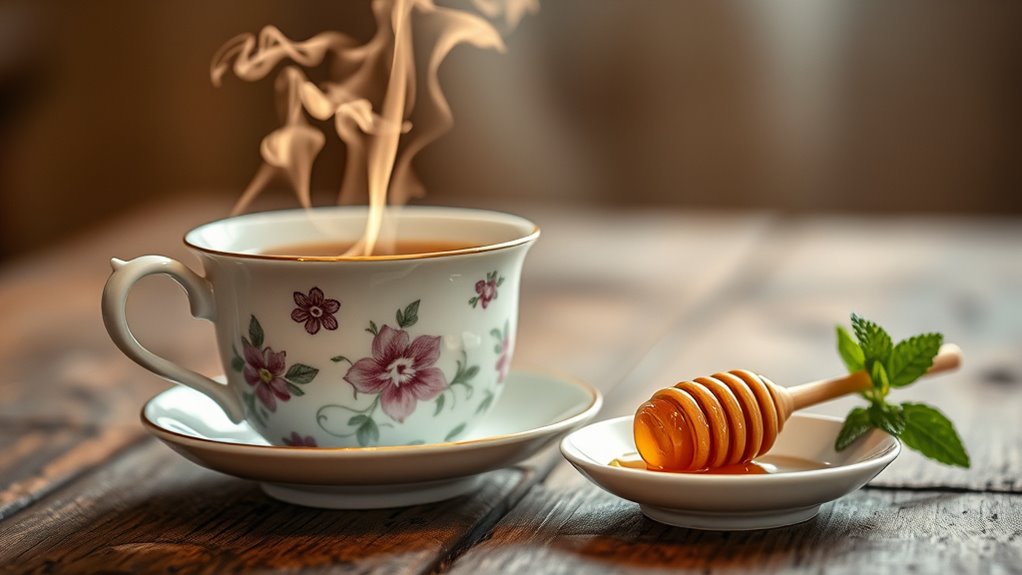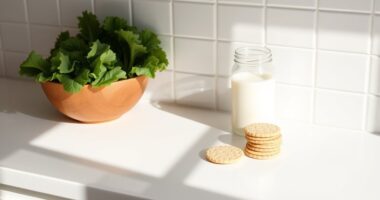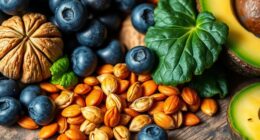Switching to herbal tea as your nightcap offers a soothing, alcohol-free way to wind down. You can craft calming blends with herbs like chamomile, lavender, and valerian root that promote relaxation and better sleep. Making this part of your nightly routine creates a mindful ritual that signals your body it’s time to unwind. If you want to explore how these herbal infusions can transform your evenings, keep going to discover more about peaceful, natural sleep options.
Key Takeaways
- Herbal teas like chamomile and lavender create calming bedtime rituals that replace alcohol for relaxation.
- Sleep-promoting infusions with passionflower or valerian help improve sleep quality naturally.
- Preparing personalized herbal blends fosters mindful routines, signaling the body to unwind.
- Replacing alcohol with tea supports healthier sleep, reduces anxiety, and enhances overall well-being.
- Tea-based nightly rituals encourage a gentle, natural transition to rest without artificial sedatives.

Many people are turning to tea as the ideal nightcap, replacing heavier, alcohol-based drinks with a soothing, natural alternative. This shift is driven by a desire for healthier relaxation routines and a better night’s sleep. Herbal blends and sleep promoting infusions have gained popularity because they offer a calming effect without the foggy aftermath of alcohol. These beverages are easy to prepare and can become a comforting part of your nightly ritual, signaling to your body that it’s time to unwind.
Herbal blends are carefully crafted combinations of herbs known for their relaxing properties. You might find blends that include chamomile, lavender, lemon balm, and valerian root—each chosen for their ability to promote tranquility. When you steep these herbs, the resulting tea becomes more than just a warm drink; it transforms into a potent sleep aid. Unlike caffeinated teas, these herbal infusions contain no stimulants, making them perfect for winding down at the end of your day. The act of brewing and sipping these herbal blends helps you slow your mind and body, creating a calming atmosphere that encourages sleep.
Herbal blends with chamomile, lavender, and valerian promote tranquility and restful sleep.
Sleep promoting infusions are designed specifically to support restful nights. They often combine multiple herbs with synergistic effects, enhancing their ability to ease tension and reduce anxiety. For example, a blend might include passionflower and skullcap, known for their sedative qualities, along with magnesium-rich herbs like spearmint. Drinking these infusions about 30 minutes before bed can help you shift from the busyness of the day into a state of relaxation. The warmth of the tea, along with the natural properties of the herbs, can lower cortisol levels and relax your muscles, setting the stage for a more restorative sleep. Incorporating herbal remedies into your nightly routine can further enhance their calming effects.
You might also enjoy creating your own herbal blends tailored to your preferences. Experimenting with different herbs allows you to find the perfect combination that relaxes you most. The ritual of preparing your tea—measuring herbs, boiling water, and steeping—becomes a mindful practice that signals your body it’s time to wind down. This simple act helps establish a calming routine, making your nightly ritual both comforting and effective. Over time, replacing alcohol with herbal blends and sleep-promoting infusions can notably improve your sleep quality, mood, and overall well-being.
In the end, choosing tea as your nightcap isn’t just about replacing drinks; it’s about embracing a healthier, more mindful way to end your day. These herbal and sleep-promoting infusions offer a natural, gentle path to relaxation, helping you enjoy peaceful nights without relying on alcohol or artificial sedatives.
Frequently Asked Questions
Can Tea Replace Alcohol for Sleep Improvement?
Yes, tea can replace alcohol for sleep improvement. By choosing alcohol alternatives like herbal teas, you promote nighttime relaxation without the negative effects of alcohol. Teas such as chamomile or valerian root help calm your mind and body, making it easier to fall asleep naturally. Incorporating a relaxing tea ritual into your evening routine can enhance your sleep quality and create a soothing way to unwind without relying on alcohol.
Which Teas Are Best for Reducing Nighttime Anxiety?
Herbal infusions with sleep-promoting herbs are your best bet for reducing nighttime anxiety. Teas like chamomile, lavender, and valerian root contain natural compounds that relax your mind and body. Drinking these before bed can calm your nerves and improve sleep quality. You might find that incorporating these teas into your nightly routine helps ease anxiety naturally, making your nights more restful without relying on medication or alcohol.
Are There Any Health Risks With Herbal Nightcaps?
Herbal nightcaps are generally safe if you pay attention to herbal safety and side effect awareness. However, some herbs can cause allergic reactions or interact with medications, so it’s important to research each ingredient. You should also avoid excessive intake, as high doses might lead to drowsiness or stomach upset. Always consult with a healthcare professional if you’re unsure about specific herbs or if you’re pregnant or taking medications.
How Long Before Bed Should I Drink My Tea?
Think of your bedtime tea like a gentle lullaby—drink it about 30 to 60 minutes before sleep to maximize relaxation. Use proper brewing techniques for a calming effect, and store your tea in a cool, dark place to preserve its soothing properties. Drinking too close to bedtime might disrupt your sleep, so give yourself enough time to enjoy the tea’s calming benefits without rushing.
Can Tea Help With Insomnia More Than Traditional Remedies?
Yes, tea, especially herbal infusions like chamomile or lavender, can help with insomnia more than traditional remedies by promoting relaxation. Incorporate tea meditation into your nightly routine to enhance its calming effects, focusing on slow, mindful sipping. Unlike some traditional remedies, herbal infusions target stress and anxiety naturally, making them a gentle yet effective way to improve sleep quality and create a peaceful bedtime ritual.
Conclusion
Imagine ending your day with a warm, soothing cup of tea, turning your nightly routine into a tranquil ritual. Just like a gentle lullaby, tea eases your mind and prepares you for restful sleep—all without the haze of alcohol. Embrace this calming tradition and let each sip be a gentle wave washing away the day’s worries. With tea as your new nightcap, you create a peaceful ending, like a soft sunset fading into a peaceful night.










